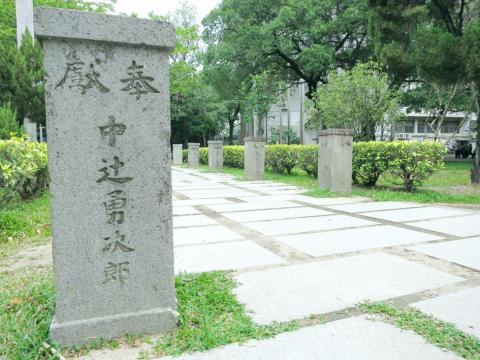The Taichung City Government yesterday urged Legislative Deputy Speaker Hung Hsiu-chu (洪秀柱) to refrain from politicizing cultural and historic issues, following Hung’s criticism of the city government’s plan to repair a collapsed torii in the city.
A torii is a structure marking the entrance to a traditional Japanese Shinto shrine, with two vertical poles and a horizontal beam across the top.
In response to Taichung Mayor Lin Chia-lung’s (林佳龍) announcement that the city government plans to renovate Taichung Park (台中公園), where the torii is located, to recover the city’s “past glory,” and “historical identity,” Hung said on Facebook that the move praises the nation’s colonial rulers and “twists cultural identity.”

Photo: Loa Iok-sin, Taipei Times
“The torii of the [former] Shinto shrine is a symbol of how the Japanese colonial rulers tried to forcibly destroy Taiwanese traditions; it is a humiliating reminder of colonialism, and represents no Taiwanese identity and spirit,” Hung said. “If there is any historical resonance to it, what is it other than the pain Taiwan had to suffer once it became a colony? If there is historical identity, what is there besides Japanized identity? How could our local government head so brutally castrate our so-called ‘historical identity,’ praise the colonialists and call it ‘past glory?’”
Taichung City Information Bureau Director-General Cho Kuan-ting (卓冠廷) disagreed with Hung, saying that the torii could enrich the cultural landscape of the park.
“Our project is not only about repairing the torii, the plan is to renovate Taichung park, and repair all the attractions and buildings in the park — including the Taichung Park Pavilion, the North Gate, Zhongzheng Bridge and the night watch tower — and make all of them cultural landmarks in the city,” Cho said. “Repairing the Torii has nothing to do with the debate over cultural identity, it is about respecting history, and allowing cultural diversity in this country.”
Built in 1908, Taichung Park is the oldest park in the city and the twin pavilion standing in the middle of the park’s lake is often described as a symbol of the city.
In the colonial period, there was a Japanese Shinto shrine called Taichu Jinja in the park.
After the Japanese surrender in 1945, the incoming Chinese Nationalist Party (KMT) regime tore down the main building of the shrine, but the remains of the torn-down torii have been left lying in the park.

CHANGING LANDSCAPE: Many of the part-time programs for educators were no longer needed, as many teachers obtain a graduate degree before joining the workforce, experts said Taiwanese universities this year canceled 86 programs, Ministry of Education data showed, with educators attributing the closures to the nation’s low birthrate as well as shifting trends. Fifty-three of the shuttered programs were part-time postgraduate degree programs, about 62 percent of the total, the most in the past five years, the data showed. National Taiwan Normal University (NTNU) discontinued the most part-time master’s programs, at 16: chemistry, life science, earth science, physics, fine arts, music, special education, health promotion and health education, educational psychology and counseling, education, design, Chinese as a second language, library and information sciences, mechatronics engineering, history, physical education

DEADLOCK: As the commission is unable to forum a quorum to review license renewal applications, the channel operators are not at fault and can air past their license date The National Communications Commission (NCC) yesterday said that the Public Television Service (PTS) and 36 other television and radio broadcasters could continue airing, despite the commission’s inability to meet a quorum to review their license renewal applications. The licenses of PTS and the other channels are set to expire between this month and June. The National Communications Commission Organization Act (國家通訊傳播委員會組織法) stipulates that the commission must meet the mandated quorum of four to hold a valid meeting. The seven-member commission currently has only three commissioners. “We have informed the channel operators of the progress we have made in reviewing their license renewal applications, and

The High Prosecutors’ Office yesterday withdrew an appeal against the acquittal of a former bank manager 22 years after his death, marking Taiwan’s first instance of prosecutors rendering posthumous justice to a wrongfully convicted defendant. Chu Ching-en (諸慶恩) — formerly a manager at the Taipei branch of BNP Paribas — was in 1999 accused by Weng Mao-chung (翁茂鍾), then-president of Chia Her Industrial Co, of forging a request for a fixed deposit of US$10 million by I-Hwa Industrial Co, a subsidiary of Chia Her, which was used as collateral. Chu was ruled not guilty in the first trial, but was found guilty

Taiwan People’s Party (TPP) Chairman Huang Kuo-chang (黃國昌) yesterday appealed to the authorities to release former Taipei mayor Ko Wen-je (柯文哲) from pretrial detention amid conflicting reports about his health. The TPP at a news conference on Thursday said that Ko should be released to a hospital for treatment, adding that he has blood in his urine and had spells of pain and nausea followed by vomiting over the past three months. Hsieh Yen-yau (謝炎堯), a retired professor of internal medicine and Ko’s former teacher, said that Ko’s symptoms aligned with gallstones, kidney inflammation and potentially dangerous heart conditions. Ko, charged with